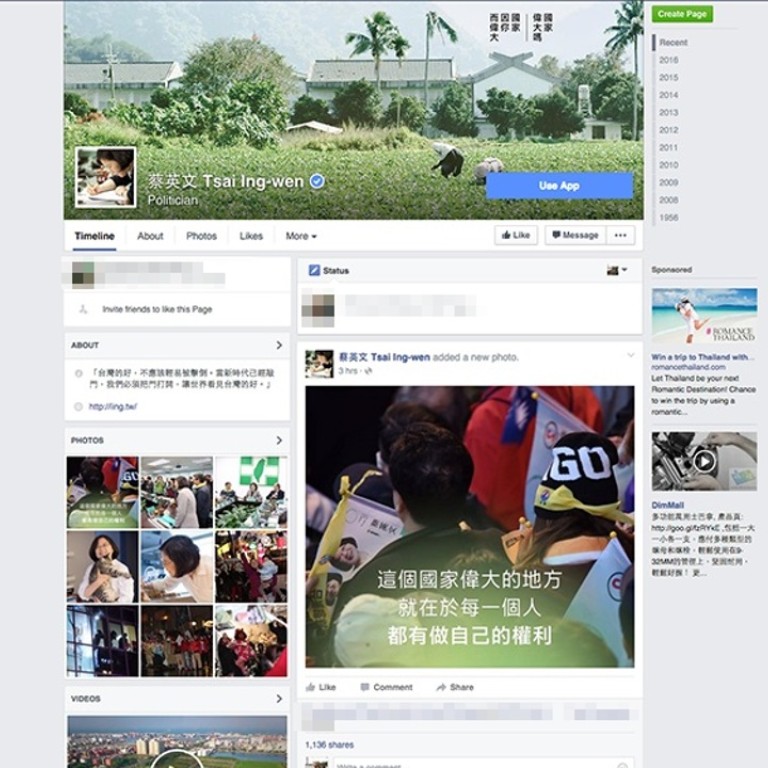
Taiwan president-elect Tsai Ing-wen’s Facebook page bombarded with comments attacking any move by island towards independence
The Facebook page of Taiwan’s president-elect Tsai Ing-wen has been bombarded with comments warning the island against declaring independence, with many of the criticisms apparently originating on the mainland where the popular social media website is banned.
Tsai and her Democratic Progressive Party, which won a majority in Saturday’s vote, welcomed the comments as an exercise in free expression.
A trickle of critical comments began after her victory speech on Saturday and escalated into a wave beginning Wednesday night. By Thursday evening, more than 70,000 comments had been posted in less than 24 hours.
One comment was accompanied by a illustration of a police officer holding a brick with a note that read: “If you dare say Taiwan independence, I will come out and enforce the law.”
Others referred to Tsai as a “provincial governor”.
The campaign appeared to be the work of Diba, a mainland-based online group with more than 20 million followers on Baidu.
READ MORE: Taiwan’s first female president Tsai Ing-wen warns China after landslide victory
It issued a call to arms on its Weibo account before the volley began, asking for help in producing, up-voting and translating comments, most of which were in simplified Chinese characters, rather than the traditional ones that the island and Hong Kong uses.
Mainlanders are prevented from accessing Facebook by the government’s censorship firewall, but work-arounds are possible with a little technical know-how.
The state-run Global Times said on Tuesday the ongoing exchange of opinions reflected the “mushrooming” culture on the mainland, while Taiwan’s was in decline.
But the relatively liberal Beijing News expressed wariness over the campaign. “Before, we called these commentators paid posters, now we call them ‘patriotic soldiers’,” said a commentary published on official the News official WeChat social media account.
Tsai posted a message on Thursday, welcoming the exchange of views: “The greatness of this country is that everyone has their own rights.”

A spokesman for the DPP, Ruan Chao-hsiung, said the party did not object to the messages as internet users on the mainland were engaging in freedom of speech. “As long as their comments are not overly extreme, we have full respect for them,” Ruan said.
Some Taiwanese responded to the taunts by congratulating mainlanders that they were able to access Facebook.
“We have freedom of speech, freedom of assembly and personal freedom. You people have none of that,” said one.
The Facebook pages of Sanli News and Taiwan’s Apply Daily have also been flooded by critical comments, accusing them of supporting Tsai and her DPP.
Meanwhile, an internet user on the mainland told the tech blog PingWest he was part of a team of translators who posted a statement in English on Facebook about the Taiwanese singer Chou Tzu-yu. She issued an apology last Friday for waving a Taiwanese national flag on a South Korean TV programme in November.
Elections observers said the row might have led to backlash against pro-Beijing candidates in Saturday’s elections.
The mainland considers Taiwan a breakaway province and has threatened to take the island back by force if it declares independence. Tsai says she supported the status quo in cross-strait relations.

